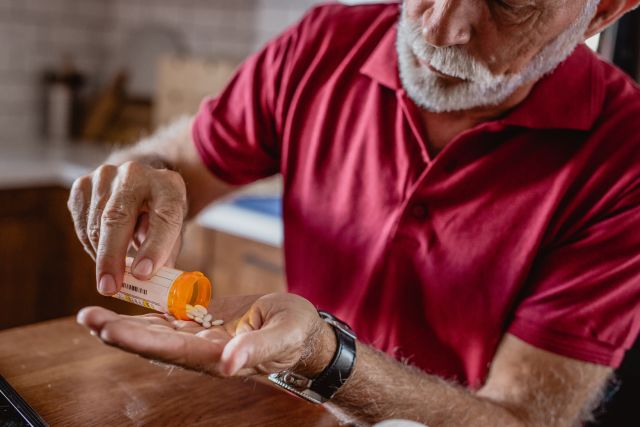Updated on October 16, 2024.
Although COVID-19 can make anyone ill, there are some people who may be hit harder by an infection with the virus. People with heart issues, for example, are at higher risk for severe infections or complications from COVID. These issues of concern include heart failure, coronary artery disease, cardiomyopathy (a disease of the heart muscles), and high blood pressure, according to the Centers for Disease Control and Prevention (CDC).
How COVID is linked to heart issues
One of the primary effects of COVID on the body is inflammation. When the body is exposed to SARS-CoV-2 (the virus that causes COVID), the immune system goes into overdrive. This can lead to inflammation throughout the body. It can also cause blood to clot more readily than usual.
Issues related to inflammation
The effects of inflammation on the heart may include myocarditis, a condition that involves the middle layer of the heart wall tissue becoming inflamed. (That tissue wall is called the myocardium.) Myocarditis can cause the heart to struggle to pump properly and can lead to atrial fibrillation (irregular heart rhythm). In extreme cases, the heart weakens so much that it can’t pump.
Issues related to blood clots and plaque
COVID may also increase the risk of dangerous blood clots forming in the heart. These include large clots that can lead to heart attack or stroke, as well as very small blood clots called microclots that form in tiny blood vessels.
COVID-related inflammation may also cause plaque in coronary arteries to break off, which may also contribute to heart attack. (Plaque is an accumulation of fatty substances that can block blood vessels. This condition is known as atherosclerosis. The coronary arteries are blood vessels that supply the heart muscle with the nourishment it needs to pump effectively.)
Connections to Long COVID
Long COVID—which involves lingering symptoms of COVID that may last for weeks, months, or even years—may also be connected to heart issues. A person’s risk of heart disease and stroke are elevated for as long as one year after infection with COVID. Meanwhile, the virus may survive in the body much longer in people who have atherosclerosis. Experts believe that the virus may remain in certain immune cells that respond to plaque buildup.
Conditions associated with aging
Additional links between heart problems and COVID may be more indirect. Advancing age may play a role, for example. Conditions like high blood pressure and diabetes, which contribute to the development of heart disease, are more common among older people. The risk of severe illness from a COVID infection goes up in people who have underlying medical conditions such as these.
How to protect your health
If you have heart disease, it’s important to make sure you’re doing all you can to protect your heart health. That includes avoiding exposure to COVID. Here are some things you can do to optimize your heart health while boosting your resistance to infections like COVID:
Get vaccinated and stay up-to-date with COVID vaccines
This is the number-one protective measure you can take. COVID vaccines are safe and effective at helping prevent severe illness, hospitalization, or death from COVID-19. According to the CDC, everyone ages six months and older should get the most recent updated COVID-19 vaccine.
Keep up with medications
That means taking your medications as prescribed by your healthcare provider (HCP). Make sure not to let your prescriptions run out. Always give yourself plenty of time to get refills, advises Mariell Jessup, MD, FAHA, Chief Science and Medical Officer of the American Heart Association.
Eat healthfully
Patients should watch their diet, Dr. Jessup notes, and monitor their weight if they’ve been advised to do so by their HCP. It’s also important to be careful about salt. You can explore heart-healthy, low-sodium diets like the DASH diet in cookbooks or online.
Stay active
Exercise is key to a healthy heart, as it can help your heart muscles get stronger and lower your cholesterol and blood pressure levels. Stick to aerobic activities like swimming, walking, and biking, or equivalent indoor exercises.
The CDC recommends getting 150 minutes each week of moderate-intensity exercise (think brisk walking or light cycling). If you have heart disease and you haven’t exercised in a while, ease into it. You can work your way toward (and beyond) that 150-minute goal. Be sure to talk with your HCP before starting a new exercise routine.
Try to keep stress under control
Take steps to counter the effects of stress, such as meditating, staying connected with friends and family, and improving your sleep hygiene.
Talk to your HCP before taking supplements or over-the-counter remedies
Some products—such as decongestants, ibuprofen, and other nonsteroidal anti-inflammatory drugs (NSAIDs)—could raise your blood pressure.
Take steps to avoid infection
Other steps you can take to prevent getting or spreading COVID include:
- Wearing a mask in crowded or poorly ventilated spaces or when you’re around people who may be infected
- Washing your hands often with soap and water for at least 20 seconds
- Covering coughs and sneezes with a tissue that you then throw away
- Not touching your face with unwashed hands
Know when and how to seek help
If you have an existing heart condition and you develop symptoms that might be COVID, such as fever or shortness of breath, don’t hesitate to contact your HCP. If you have heart disease, it’s important to be able to recognize serious warning signs of both heart issues and COVID.
Call 911 and seek immediate medical attention if you develop warning signs of a stroke or heart attack, such as:
- Pain, squeezing, burning, or pressure in the center of the chest
- Pain or numbness in one or both arms, the back, neck, jaw, or stomach
- Sudden nausea or vomiting
- Shortness of breath
- Lightheadedness or dizziness
- Unexplained fatigue
- Cold sweat
- Sudden numbness or weakness of the face, arm, or leg, particularly on one side of the body
- Sudden confusion or trouble speaking
- Vision loss in one or both eyes
- Loss of balance or coordination
- Sudden and severe headache
Severe symptoms of COVID also warrant emergency medical attention. These may include:
- Difficulty breathing
- Persistent pain or pressure in the chest
- Feeling suddenly confused
- Having trouble waking or staying awake
- Discolored lips, skin, or nail beds (pale, gray, or blue-colored, depending on skin tone)
For cases that aren’t emergencies but that need attention, know how to contact your HCP before serious problems arise.
“You should know exactly what number you can text, what number you can call, what address you can send an email to,” advises Eduardo Sanchez, MD, MPH, FAAFP, Chief Medical Officer for Prevention at the American Heart Association.
Don’t be afraid to get help
During the height of the pandemic, HCPs noticed a drop in the number of heart attack and stroke patients in emergency departments. This suggested that that many patients experiencing heart crises stayed at home instead of getting help.
But putting off care or ignoring treatable conditions could lead to dangerous outcomes. Be sure to get the help you need, when you need it.







